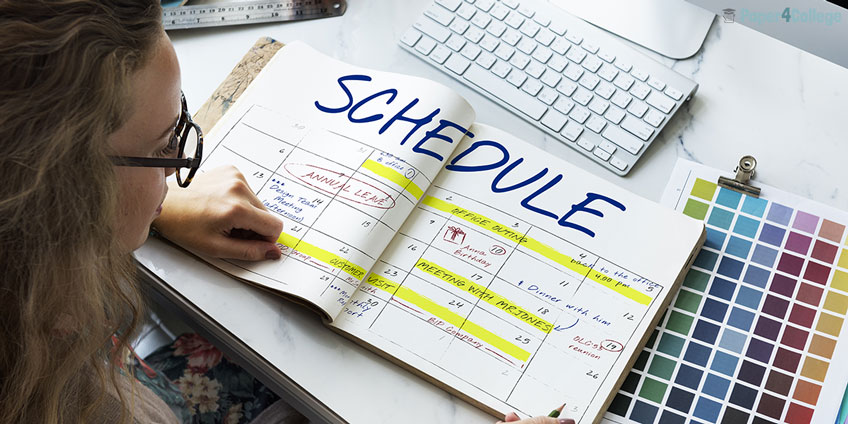Have a Schedule: Be Productive and Happy. Part 2

Effective Memorization
You can memorize information only if you repeat it many times. You memorize a subject better by reading it and then looking at it several times later than by memorizing everything in one study session. The more times you look at it again, the more info quickly returns: after spending 45 minutes studying the material, you can see it again for 25 minutes three days later, then see it again for 15 minutes six days later, for example.
Take Regular Breaks
You can understand the information better if you break down the difficulties. Thus, you can focus on one task, then start another one during another study session. Only certain exercises require a long time of work in a row: homework, documentary research, reading a book, etc. Program them when it is suitable for this type of work, for example, on the weekends or in the free afternoon in the library. Do not forget to take small breaks every 50 minutes to relax your eyes and stretch your legs. And do not forget to use the services of websites offering homework help – this greatly simplifies academic life.
Find the Perfect Time
You should plan your study sessions at the right time, that is while you are having the best mental abilities to learn the information. You remember that you should change activities, and how can you begin studying better? Perhaps you have read somewhere that we should start with what seems the most difficult task. You constantly run the risk of starting with what we "prefer" and push the rest for tomorrow, then to the last minute. In case of a task that you risk to spend much time on (essay, internship report, or math exercise), you will waste more time than you have expected there (at the expense of other tasks) and will not move on.
How to Start?

Begin to do the tasks that require concentration but can be accomplished quickly, for example, proofreading, annotation of your essay, having a look at your notes, etc. After that, you have positive emotions of advancing, your motivation increases for the next tasks. You should complete difficult assignments (math problem, essays) in advance – if you face difficulties or have questions, you can ask for help and return to studying the next day.
Always remember that this kind of work should be planned over days. This tip may be suitable for working hours during the week between classes. The time you can study much, for example, during the weekend, a free morning or on holiday, may give you the opportunity to preschedule some work, such as writing a dissertation, report, math problem or an essay, reading a long document or a book, reviewing a whole chapter and producing summary sheets, completing more complex assignments, etc. This work is more productive because it has been prepared by study sessions during the week.
Plan Wisely

Every student should know how to use free time for small tasks: to re-read notes or cards during the time in transport, do exercises between classes, read a book during a train trip, etc. Define the kind of work convenient for the situation and the time you have. Often, we work so well at some times and places that we have to remember it and use this knowledge.
Have More Time for Writing Essays

In the university, you have to write essays more often and more thoroughly: it is not only the knowledge of your lessons, you have to learn how to reuse your skills in solving difficult problems, how to apply your analytic skills, build up your structure and give the presentation of your ideas in a well-written essay. The exercises to be done are important too, but firstly, you should leave more time for the reflection and further research. For example, you need to study every day and solve the problems to master your skills without delay, identify points you cannot get to ask your professor, do research on the Internet, get some books or articles to understand the topic more deeply and keep time to write your essays, reports, and do your homework.
Find Your Own Rhythm

These tips would be useful for all students, but you have to accept them because you are special, so you have different rhythms or different difficulties. Try to get to know your personal rhythms better and find the right methods for your goals. Are you too absent-minded and do not work enough? You have to define your priorities taking into account your academic goals and make a convenient schedule.
You may have to quit some hobbies or activities, but it is for your future. Are you always late to finish your essay? Find the cause of this problem. Do you have problems with concentration?? Make your study sessions short and do not forget to change activities frequently.
Are you an A+ student who cannot study alone? Try group work, or study with a more organized friend or set challenges that give you motivation and finally make a plan to reach your goal.
Do you think that essay writing is not for you? This is not a sentence, and you can always ask for professional help.
Avoid Stress

You feel discouraged when you work but you do not reach success: you may need to work more efficiently, improve concentration, learn more regularly, cut through the difficulties in understanding, work on your weaknesses or practice more to do the exercises similar to those you will have on exams.
Are you still exhausted and stressed? And what if you take a little more care of yourself? Sleep more, exercise, walk outdoors and avoid drugs and other harmful things. In the end, it is you and only you who can find the organization tool that suits you. Feel free to slightly modify your schedule after a few days if you cannot manage it. Then, take the rhythm and keep it: the more regular you become, the easier it will be to work.
